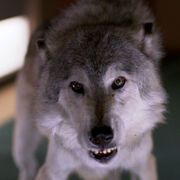
An Earth wolf
The wolf (Canis lupus) was a carnivorous canine related to the dog, native to planet Earth.
"The Boy Who Cried Wolf" was a well known children's story about a wolf. When Julian Bashir told the story to Elim Garak, the later concluded that the moral was "to never tell the same lie twice." (DS9: "Improbable Cause")
In 2267, Spock referred to the entity Redjac, who was murdering women on the planet Argelius II, "where the inhabitants are as peaceful as sheep", as being like "a hungry wolf in that fold." (TOS: "Wolf in the Fold")
As Chakotay's grandfather got older, he believed at night he turned into a wolf and roamed the forest. (VOY: "Barge of the Dead")
In 2369, Captain Edward Jellico compared Cardassians to timber wolves, saying that they possessed an instinctive need to establish a dominant position in social situations, and thus contrived his strategy for negotiating with Gul Lemec accordingly. Counselor Deanna Troi reminded him that sometimes a wolf ended up dead in the fight for dominance, to which Jellico responded by saying that the trick was to be the wolf that was standing in the end. (TNG: "Chain of Command, Part I")
When Deanna Troi entered Lwaxana Troi's mind to find out why her mother was unconscious, an angry wolf tried to keep her away from the memories of Kestra Troi. (TNG: "Dark Page")
Wolf-like creatures sometimes appear on other habitable world, like the rogue planet Dakala, where they were hunted by the extraterrestrial Eska. (ENT: "Rogue Planet")
When The Doctor reverted a member of Species 8472 from a Human to its natural state, he commented "talk about your wolf in sheep's clothing," based on an old Earth saying. (VOY: "In the Flesh")
Chakotay compared the Hirogen to wolves since they lived in small 'packs' and roamed the galaxy hunting for 'prey'. (VOY: "Prey")
See also
External link
- Wolf at Memory Beta, the wiki for licensed Star Trek works
- Gray wolf at Wikipedia
